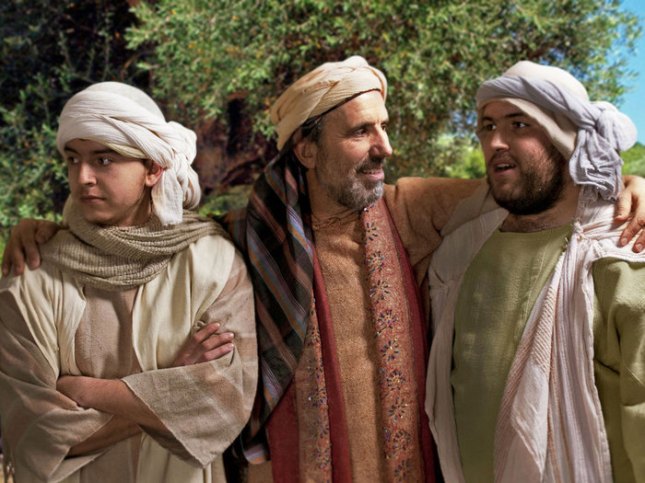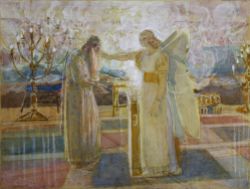THE PARABLE OF TALENTS EXPLAINED
(A biblical reflection on the 33rd ORDINARY SUNDAY [YEAR A], 19 November 2017)
 Gospel Reading: Matthew 25:14-30
Gospel Reading: Matthew 25:14-30
First Reading: Proverbs 31:10-13,19-20,30-31; Psalms: Psalm 128:1-5; Second Reading: 1Thessalonians 5:1-6
The Scripture Text
“For is will be as when a man going on a journey called his servants and entrusted to them his property; to one he gave five talents, to another two, to another one, to each according to his ability. Then he went away. He who had received the five talents went at once and traded with them; and he made five talents more. So also, he who had the two talent made two talents more. But he who had received the one talent went and dug in the ground and hid his master’s money. Now after a long time the master of those servants came and settled accounts with them. And he who had received the five talents came forward, bringing five talents more, saying, ‘Master, you delivered to me five talents; here I have made five talents more.’ His master said to him, ‘Well done, good and faithful servant; you have been faithful over a little, I will set you over much; enter into the joy of your master.’ And he also who had the two talents came forward, saying, ‘Master, you delivered to me two talents; here I have made two talents more.’ His master said to him, ‘Well done, good and faithful servant; you have been faithful over a little, I will set you over much; enter into the joy of your master.’ He also who had received the one talent came forward, saying, ‘Master, I knew you to be a hard man, reaping where you did not sow, and gathering where you did not winnow; so I was afraid, and I went and hid your talent in the ground. Here you have what is yours.’ But his master answered him, ‘You wicked and slothful servant! You knew that I reap where I have not sowed, and gather where I have not winnowed? Then you ought to have invested my money with the bankers, and at my coming I should have received what was my own with interest. So take the talent from him, and give it to him who has the ten talents. For to every one who has will more be given, and he will have abundance; but from him who has not, even what he has will be taken away. And cast the worthless servant into the outer darkness; there men will weep and gnash their teeth.’ (Matthew 25:14-30 RSV)
When you find a difficult story in the Bible, reading what comes immediately before and after helps since the evangelists often grouped parables or stories together because they had something in common. For example, a parable preceded and followed by stories about judgment probably also has something to do with being judged. The parable in today’s Gospel reading is a perfect example of this.
The parable is about a man who gave three of his servants different sums of money and then went on a journey. When he returned, he summoned his servants and demanded an accounting of the funds he had entrusted to them. The master was pleased with the first two servants who doubled their money but he was furious with the third servant who had the same amount he started with. The master then took the money from this last servant and gave it to one of the others.
Taken by itself, it’s difficult to determine what this parable is supposed to mean. Whom does the master symbolize? Who are the servants supposed to stand for? What is the moral of this story? These are questions we can best answer only after examining the context in which we find the parable.
Other parables and stories about the reign of God and Jesus’ second coming precede and follow today’s Gospel. They are about judgment and our relationship with others. It’s logical to assume the parable in today’s Gospel has a similar theme.
The master stands for Jesus, and we are the servants. The money represents the talents and abilities God has given us. Just as the master went away for awhile and then returned, Jesus will one day also return to the earth and will demand an accounting of the gifts God has given us. He will ask if we used our talents and abilities for good or for evil or if we wasted them by not using them at all. How we answer these questions will determine if we will share in the master’s joy (be called into God’s Kingdom) or if we will find ourselves in the darkness outside, wailing and grinding our teeth (experience the pains of hell).
(Source: Jerome J. Sabatowich, Cycling Through the Gospels – Gospel Commentaries for Cycles A, B, and C, pages 110-111.)
Short Prayer: Lord Jesus, thank You for all the gifts You have given me. Help me to be aware of these gifts, that I may surrender them to You and use them cheerfully and generously to build up Your Kingdom. Amen.
Jakarta, 18 November 2017
A Christian Pilgrim












![250px-Gregorythegreat POPE ST. GREGORY THE GREAT [540-604]](https://achristianpilgrim.files.wordpress.com/2015/05/250px-gregorythegreat.jpg?w=132&resize=132%2C186#038;h=186)

![PAUS KLEMENS I - 4 POPE ST. CLEMENT I {PONTIFICATE: ca. 91- ca. 101]](https://achristianpilgrim.files.wordpress.com/2015/05/paus-klemens-i-4.jpg?w=214&resize=214%2C284#038;h=284)
![PAUS KLEMENS V POPE CLEMENT V [PONTIFICATE: 1305-1314]](https://achristianpilgrim.files.wordpress.com/2015/05/paus-klemens-v.jpg?w=241&resize=241%2C284#038;h=284)
![PAUS BONIFACIUS VIII POPE BONIFACE VIII [PONTIFICATE: 1294-1301]](https://achristianpilgrim.files.wordpress.com/2015/05/paus-bonifacius-viii.jpg?w=178&resize=178%2C284#038;h=284)
![PAUS GREGORIUS VII POPE ST. GREGORY VII [PONTIFICATE: 1073-1085]](https://achristianpilgrim.files.wordpress.com/2015/05/paus-gregorius-vii.jpg?w=167&resize=167%2C227#038;h=227)
![POPE PIUS X - 111 POPE ST. PIUS X OFS [PONTIFICATE: 1903-1914]](https://achristianpilgrim.files.wordpress.com/2015/05/pope-pius-x-111.jpg?w=142&resize=142%2C227#038;h=227)
![POPE BENEDICT XV POPE BENEDICT XV [PONTIFICATE: 1914-1922]](https://achristianpilgrim.files.wordpress.com/2015/05/pope-benedict-xv.jpg?w=153&resize=153%2C227#038;h=227)
![POPE PIUS XI POPE PIUS XI OFS [PONTIFICATE: 1922-1939]](https://achristianpilgrim.files.wordpress.com/2015/05/pope-pius-xi.jpg?w=167&resize=167%2C227#038;h=227)
![POPE PIUS XII - 112 POPE PIUS XII [PONTIFICATE: 1939-1958]](https://achristianpilgrim.files.wordpress.com/2015/05/pope-pius-xii-112.jpg?w=304&resize=304%2C413#038;h=413)
![PAUS YOHANES XXIII - 2 POPE ST. JOHN XXIII OFS [PONTIFICATE: 1958-1963]](https://achristianpilgrim.files.wordpress.com/2015/05/paus-yohanes-xxiii-2.jpg?w=333&resize=333%2C413#038;h=413)
![POPE PAUL VI - 100 POPE PAUL VI [PONTIFICATE: 1963-1978]](https://achristianpilgrim.files.wordpress.com/2015/05/pope-paul-vi-100.jpg?w=334&resize=334%2C414#038;h=414)


![KARDINAL RATZINGER - 1 POPE BENEDICT XVI [PONTIFICATE 2005-2013 - RESIGNATION]](https://achristianpilgrim.files.wordpress.com/2015/05/kardinal-ratzinger-1.jpg?w=391&resize=391%2C281#038;h=281)
![Paus Fransiskus upload POPE FRANCIS [PONTIFICATE 2013 - ]](https://achristianpilgrim.files.wordpress.com/2015/05/paus-fransiskus-upload.png?w=175&resize=175%2C202#038;h=202)
![FA NGPBROL DENGAN BURUNG2 ST. FRANCIS OF ASSISI [1181-1226]](https://achristianpilgrim.files.wordpress.com/2015/05/fa-ngpbrol-dengan-burung2.jpg?w=157&resize=157%2C202#038;h=202)
![ST. FRANCIS XAVIER - 008 ST. FRANCIS XAVIER [1506-1552]](https://achristianpilgrim.files.wordpress.com/2015/05/st-francis-xavier-008.jpg?w=161&resize=161%2C202#038;h=202)
![Ignatius of Loyola - 100 ST. IGNATIUS OF LOYOLA [1491-1556]](https://achristianpilgrim.files.wordpress.com/2015/05/ignatius-of-loyola-100.jpg?w=136&resize=136%2C202#038;h=202)
![DAMIEN OF MOLOKAI - 02 ST. DAMIEN OF MOLOKAI [1840-1889]](https://achristianpilgrim.files.wordpress.com/2015/05/damien-of-molokai-02.jpg?w=193&resize=193%2C264#038;h=264)
![ANTONIUS DARI PADUA - 1 ST. ANTHONY OF PADUA - FRANCISCAN [1195-1231]](https://achristianpilgrim.files.wordpress.com/2015/05/antonius-dari-padua-1.jpg?w=258&resize=258%2C264#038;h=264)
![SANTA KLARA DARI ASSISI - 07 ST. CLARE OF ASSISI [1195-1253]](https://achristianpilgrim.files.wordpress.com/2015/05/santa-klara-dari-assisi-07.jpg?w=182&resize=182%2C264#038;h=264)
![SANTA ELISABET DARI HUNGARIA - 09 ST. ELIZABETH OF HUNGARY OFS [1207-1231] - QUEEN](https://achristianpilgrim.files.wordpress.com/2015/05/santa-elisabet-dari-hungaria-09.jpg?w=152&resize=152%2C206#038;h=206)
![ST. LOUIS IX - 01 ST. LOUIS IX OFS - KING OF FRANCE [1215-1270]](https://achristianpilgrim.files.wordpress.com/2015/05/st-louis-ix-01.jpg?w=159&resize=159%2C206#038;h=206)

![FR. MAXIMILIAN KOLBE - 000 ST. MAXIMILIAN KOLBE OFMCONV. [1894-1941; MARTYR OF CHARITY]](https://achristianpilgrim.files.wordpress.com/2015/05/fr-maximilian-kolbe-000.jpg?w=160&resize=160%2C206#038;h=206)
![Childrens-Home-of-the-Immaculate-Heart-baby BLESSED MOTHER TERESA [1910-1997] - FRIEND OF THE POOR](https://achristianpilgrim.files.wordpress.com/2015/05/childrens-home-of-the-immaculate-heart-baby.jpg?w=405&resize=405%2C326#038;h=326)
![therese ST. TERESA OF LISIEUX OCD [1873-1897]](https://achristianpilgrim.files.wordpress.com/2015/05/therese.jpg?w=232&resize=232%2C326#038;h=326)
![John of the Cross 23 ST. JOHN OF THE CROSS OCD [1542-1591]](https://achristianpilgrim.files.wordpress.com/2015/05/john-of-the-cross-23.jpg?w=200&resize=200%2C200#038;h=200&crop=1)
![St.-Teresa-of-Avila ST. TERESA OF AVILA OCD [1515-1582]](https://achristianpilgrim.files.wordpress.com/2015/05/st-teresa-of-avila.jpg?w=150&resize=150%2C200#038;h=200)
![SANTA FRANSISKUS DARI SALES ST. FRANCIS DE SALES [1567-1622]](https://achristianpilgrim.files.wordpress.com/2015/05/santa-fransiskus-dari-sales.jpg?w=150&resize=150%2C200#038;h=200)
![ST. CATHERINE LABOURE - 06 ST. CATHERINE LABOURE [1806-1876]](https://achristianpilgrim.files.wordpress.com/2015/05/st-catherine-laboure-06.jpg?w=129&resize=129%2C200#038;h=200)
![ST. BERNARDUS DARI CLAIRVAUX - 11 ST. BERNARD OF CLAIRVAUX [1090-1153] - FOUNDER OF THE OCSO](https://achristianpilgrim.files.wordpress.com/2015/05/st-bernardus-dari-clairvaux-11.jpg?w=355&resize=355%2C397#038;h=397)


















![JACOBA OF SETTESOLLI JACOBA OF SETTESOLLI [+ 1239]](https://achristianpilgrim.files.wordpress.com/2015/05/jacoba-of-settesolli1.jpg?w=227&resize=227%2C276#038;h=276)
![RAYMUNDUS LULLUS - 1 BLESSED RAYMOND LULL OFS [1236-1314]](https://achristianpilgrim.files.wordpress.com/2015/05/raymundus-lullus-1.jpg?w=339&resize=339%2C396#038;h=396)
![ST. CLARE OF ASSISI - 17 ST. CLARE OF ASSISI [1195-1253]](https://achristianpilgrim.files.wordpress.com/2015/05/st-clare-of-assisi-17.jpg?w=298&resize=298%2C396#038;h=396)




![ANNUNCIATION - MARIA DIBERI KABAR OLEH MALAIKAT TUHAN -1001 ANNOUNCEMENT OF THE BIRTH OF JESUS [2]](https://achristianpilgrim.files.wordpress.com/2018/10/annunciation-maria-diberi-kabar-oleh-malaikat-tuhan-1001.jpg?w=243&resize=243%2C294#038;h=294)

![VISITATION - 9 MARY VISITS ELIZABETH [2]](https://achristianpilgrim.files.wordpress.com/2018/10/visitation-9.jpg?w=394&resize=394%2C291#038;h=291)
